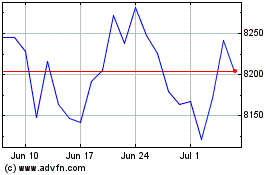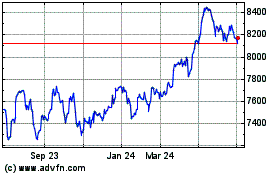Global Stocks Follow Wall Street Lower
April 25 2019 - 5:58AM
Dow Jones News
By Paul J. Davies
Stocks in Europe and several Asian markets slipped Thursday
following a weaker close for U.S. markets and poor economic data
from South Korea, one of Asia's biggest exporters.
The Stoxx Europe 600 index was down 0.2% and the U.K.'s FTSE 100
dropped 0.3% as investors digested big falls in revenue and profits
in the first quarter from major banks UBS and Barclays.
Futures pointed to a mixed open on Wall Street with the S&P
500 priced to be just 0.05% higher and the Dow Jones Industrial
Average 0.05% lower.
In Asia, the Korean Kospi index was down 0.5% after a
fourth-straight month of declining exports dragged on the local
economy. South Korean GDP shrank by 0.3% in the first quarter, its
worst performance in more than a decade. The result was a sharp
drop from 1% growth in the final quarter of 2018 and much worse
than expectations of 0.3% growth.
"The biggest quarterly contraction in Korean GDP since the
global financial crisis hit in fourth-quarter 2008 has to be bad
news," said Robert Carnell, chief economist in Asia at ING. "The
components of GDP weakness don't bode well for the quarter ahead.
It isn't hard to come up with a set of figures that would deliver
a...technical recession."
Stocks in China and Hong Kong also were lower even though the
Chinese central bank signaled support for the economy by saying it
had no intention of tightening monetary policy. Japan's central
bank was also supportive, revising its guidance to say it didn't
expect to increase interest rates for at least another year. The
Nikkei 225 rose about 0.5%.
Still, the Korean data has added to other weak numbers in recent
days, including worse-than-expected Australian inflation data and a
disappointing reading in a German business-climate survey. The
figures encouraged investors to put more money into bonds than
equities globally, according to strategists at Barclays, lifting
prices and pushing down yields.
Sweden is another country to be suffering unexpectedly low
inflation, which led its central bank on Thursday to delay its next
expected interest-rate rise, meaning it will now likely keep its
main rate at minus-0.25% for the rest of this year having
previously suggested a rise would come in the second half of
2019.
The Swedish Krona fell sharply against both the dollar and the
euro in response and was down more than 1% against both
currencies.
The steady drumbeat of such signals have been encouraging
investors to put more money into bonds than equities globally all
year, according to strategists at Barclays, lifting prices and
pushing down yields.
"Beyond the near-term reflationary effect of rising oil prices,
a hawkish shift [toward interest-rate rises] in central banks'
rhetoric is likely needed for bond yields to move much higher,"
they said.
German 10-year bund yields dropped back into negative territory
on Wednesday and sat at -0.013% on Thursday morning. U.S. 10-year
Treasury yields also fell on Wednesday, but were marginally higher
Thursday at 2.528% from 2.520%. Bond yields and prices move in
opposite directions.
The WSJ dollar index, which measures the dollar against a basket
of currencies, was up 0.1% at 91.10.
In commodities, oil continued to move higher, with Brent crude
up 1% at $75.35 a barrel. Gold was flat at $1,279.70 an ounce.
Write to Paul J. Davies at paul.davies@wsj.com
(END) Dow Jones Newswires
April 25, 2019 05:43 ET (09:43 GMT)
Copyright (c) 2019 Dow Jones & Company, Inc.
FTSE 100
Index Chart
From Mar 2024 to Apr 2024

FTSE 100
Index Chart
From Apr 2023 to Apr 2024
